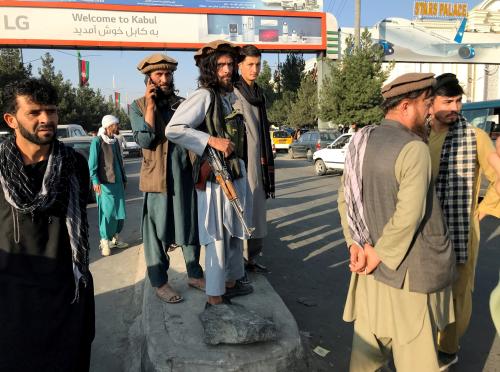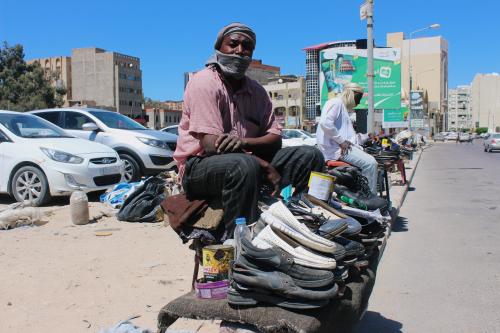Madam Chairperson, Distinguished Delegates, Ladies and Gentleman,
Once again, it is a great honor and pleasure to address this august body. Last year marked the 10th anniversary of this body’s request to the Secretary-General to appoint a representative on internally displaced persons. When this mandate was created, internal displacement was already a global crisis. Millions of persons, most of them women and children, had been driven from their homes by war, violence and gross violations of human rights, and were struggling to cope within states that could not or would not provide them with the assistance, protection and support they required. Their plight was rendered particularly desperate by an antiquated notion of sovereignty that blocked sorely-needed international attention and assistance at the doorstep of national borders.
Today, the magnitude of the problem—with an estimated twenty-five million internally displaced persons in some 50 countries—is as large as it has ever been. Moreover, the situation of many of the internally displaced remains desperate, with gaps in the national and international response, especially in the area of protection, leaving them vulnerable to deprivation, physical harm, and the loss of dignity.
Nevertheless, the international community and concerned States have taken important steps over the last decade to face up to the phenomenon of internal displacement. In reporting to you on these steps this morning, I draw upon the results of a tenth anniversary stock-taking symposium in Vienna, which was hosted by the Governments of Austria and Norway. The symposium focused on the five interconnected pillars of our activities on my mandate.
The first and over-arching pillar has been the catalytic function of advocacy and awareness-raising about the plight of the millions of internally displaced people around the world. This has centered largely on dialogue with Governments, organizations, governmental and non-governmental, and all those whose authority or scope of activities impact upon the crisis. I believe it is fair to say that, since the mandate was created, the level of awareness about the crisis has been raised considerably.
The second pillar of the mandate has been the development and promotion of a normative framework, which resulted in the Guiding Principles on Internal Displacement. These Principles restate, consolidate, and apply existing international human rights, humanitarian and refugee law by analogy, gathering them together in a comprehensible format. Since their presentation to this body in 1998, the Guiding Principles have come to be recognized as an important tool, which the Commission has encouraged be promoted, disseminated and used widely. Their growing use has been acknowledged and encouraged in resolutions by this body as well as the General Assembly, ECOSOC, the Security Council, and numerous regional organizations. The Inter-Agency Standing Committee, comprised of the major international humanitarian, development and human rights organizations, considers the Guiding Principles as the overall framework for a comprehensive response to internal displacement, and its member agencies employ them in their work in the field.
An especially welcome development has been the initiative of an increasing number of Governments in all regions of the world to enact legislation or official decrees adopting elements of the Guiding Principles directly into their national laws and policies concerning displacement. The Guiding Principles are also being used by non-governmental organizations and civil society as a tool for assessing the compliance of existing legislation and policy concerning internally displaced persons with international law. A recent example of this is the seminar in the Russian Federation, the summary of which has been submitted to the Commission in Addendum 5 to my report.
The third pillar of the mandate has been to encourage a more effective international institutional response to internal displacement. Over the last ten years, a number of important steps have been taken in this direction. Within the UN, Resident and Humanitarian Coordinators have been assigned the task of assuring the assistance and protection of the internally displaced at the field level. Their role is supplemented by the Emergency Relief Coordinator who, in 1997, was assigned the overall coordination of humanitarian assistance to the internally displaced.
The Emergency Relief Coordinator has endeavored to increase inter-agency cooperation and capacity as regards internal displacement, working through the UN Inter-Agency Standing Committee which he chairs, and in which I participate. One important decision was assigning to the Norwegian Refugee Council the task of developing and maintaining a global database which has enhanced our understanding of the global crisis of internal displacement. Another crucial development came in 2002, when an IDP Unit was created within the Office for the Coordination of Humanitarian Affairs.
A fourth pillar of the mandate is to focus on specific displacement situations, primarily through country missions. The fundamental principle that has guided my advocacy with Governments and other relevant actors is to recognize the problem as internal and falling under state sovereignty, which I fully respect. At the same time, I see sovereignty positively as a concept of responsibility to protect and assist needy persons, if necessary, in cooperation with the international community. I have undertaken twenty-five missions since the inception of the mandate, four of which (to Sudan, Turkey, Mexico and the Philippines) occurred since I last reported to the Commission.
My mission to Sudan in 2002, my third official visit to that country, took place in conjunction with a mission sponsored by USAID to address issues of return and resettlement in light of the potential for peace. A number of positive steps have since been taken. With the facilitation of several workshops organized by the OCHA IDP Unit, in addition to the policy seminar which my mandate co-sponsored with UNICEF in Rumbek, both the Government and the SPLM/A have made progress toward formulating comprehensive policies for assistance and protection of the internally displaced, in particular with regard to the issue of return.
In Turkey, my mission focused on those displaced in the southeast of the country by the conflict between the Government and the Kurdish insurgents. The Government has been active in promoting the voluntary return of the displaced over the past few years. While the international community has largely been uninvolved with the internally displaced in the country, there now appears to be greater willingness on the part of the Turkish Government to cooperate with the international community to meet the needs of the returnees and those still internally displaced.
In Mexico, my mission focused on those persons displaced by the conflict between the Government and the Zapatista rebels in Chiapas. These persons face widespread malnutrition, lack of access to drinking water, educational facilities, and means to achieve self-sufficiency. Many of them still fear for their safety in the light of the activities of paramilitary groups. I found Government officials quite willing to discuss and engage with the issue of internal displacement. In anticipation of my visit, the national Government and the state of Chiapas formed a task force on displacement, which visited some of the camps of the displaced and subsequently undertook to make a comprehensive assessment of the problem and formulate a national policy. In its recent response to my report, the Government announced plans to initiate new legislation aimed at an effective solution to the problems of internal displacement. It also indicated that it was putting in place an interagency coordination mechanism to address the problem and to devise a programme of return and resettlement for the displaced. However, some displaced persons in the so-called “autonomous communities” under the control of the Zapatistas remain beyond the reach of the Government. There is consequently a need for humanitarian agencies to engage with the national authorities and the international community to explore cooperative ways of addressing their needs.
My mission to the Philippines took place in the context of what then appeared to be the winding down of the armed conflict between the Government and the Moro Islamic Liberation Front in 2000 in the archipelago of Mindanao. I was pleased to find that national authorities openly acknowledged the problem of internal displacement and expressed their commitment to finding durable solutions. The Government had indeed provided a significant level of assistance to the internally displaced, and was supporting programs of return and resettlement. However, there were still important gaps between the Government?s policy statements concerning the internally displaced and implementation on the ground. To fill that gap and better coordinate on various matters, I recommended that the Government consider organizing a national conference on internal displacement bringing in representatives from all levels of government, NGOs, civil society, and United Nations agencies. I am pleased to note that the Government endorsed this recommendation and plans to act upon it.
Unfortunately, since the time of my mission, armed conflict has reignited in Mindanao, and it is reported that nearly a quarter million persons have been newly displaced and others remain fearful of returning to their homes. I should note that I was very much encouraged by the declared commitment of the parties to continue the peace process and would urge them to maintain that commitment to ensure a final resolution to the conflict.
I would like to acknowledge that the Governments of Sudan, Mexico, and the Philippines all raised the possibility of hosting regional seminars on the issue of internal displacement. I welcome these initiatives and stand ready to cooperate with them. I should point out, with regard to the Sudan, that the plans for such a seminar have had to be postponed on several occasions for various reasons. I therefore hope that the seminar will soon come to fruition.
I am glad to report that I have received the invitation for a mission from the Government of the Russian Federation, although a scheduled visit had been postponed because of the concerns of the authorities in Chechnya. It is now tentatively being planned for Fall of this year. In addition, this year I have requested to undertake missions to Afghanistan, Colombia, Cote d?Ivoire, Democratic Republic of the Congo, Liberia, Myanmar, Sierra Leone, Sri Lanka and Uganda and I look forward to positive responses from the Governments concerned.
As the fourth pillar, the mandate has undertaken research into internal displacement issues. Through the support of the Project on Internal Displacement, now jointly sponsored by the Brookings Institution and the Johns Hopkins University?s School of Advanced International Studies, an extensive body of research has been built up over the past ten years, starting with the initial in-depth studies and more recently branching out into particular aspects of the problem. Moreover, it is most gratifying that our work has helped to encourage what is now a blossoming field of study on internal displacement worldwide. To further encourage this positive trend, in 2002, I established a Center for Displacement Studies at the School of Advanced International Studies, where I teach a course on the issue and plan to support a broader programme of research, scholarly discourse and outreach activities.
Madame Chairperson, the current war in Iraq is a tragic reminder that the crisis of internal displacement and its humanitarian consequences remain a major challenge. The international community is called upon to rise to this challenge by making the established normative and institutional frameworks deliver the needy effective protection and assistance. Creative thinking will be required to accomplish this task. While protecting and assisting the internally displaced is first and foremost the responsibility of national authorities, it is now well-established that Governments, for lack of capacity or will, often do not provide the required protection and assistance. To whom do they turn, but to the international community?
Thank you, Madame Chairperson and Distinguished Delegates.


Commentary
Statement of the Representative of the UN Secretary-General on Internally Displaced Persons
April 10, 2003